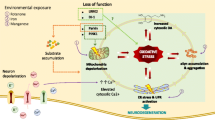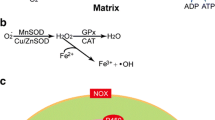Abstract
The etiology of sporadic Parkinson’s disease (PD) is unknown, although mitochondrial dysfunction and oxidative stress have been implicated in the mechanisms associated with PD pathogenesis. Dopamine (DA) neurons of the substantia nigra pars compacta have been shown to degenerate to a greater extent in PD than other neurons suggesting the possibility that DA itself may be contributing to the neurodegenerative process. This review discusses our work on the effects of DA oxidation and reactive DA quinones on mitochondrial function and protein modification and the potential for exacerbating toxicity associated with mitochondrial dysfunction in PD.
Similar content being viewed by others
References
Banerjee R, Starkov AA, Beal MF, Thomas B (2009) Biochim Biophys Acta 1792:651–663
Berman SB, Hastings TG (1999) J Neurochem 73:1127–1137
Berman SB, Watkins SC, Hastings TG (2000) Exp Neurol 164:415–425
Betarbet R, Sherer TB, MacKenzie G, Garcia-Osuna M, Panov AV, Greenamyre JT (2000) Nat Neurosci 3:1301–1306
Betarbet R, Canet-Aviles RM, Sherer TB et al (2006) Neurobiol Dis 22:404–420
Bueler H (2009) Exp Neurol 218:235–246
Cannon JR, Tapias V, Na HM, Honick AS, Drolet RE, Greenamyre JT (2009) Neurobiol Dis 34:279–290
Caudle WM, Richardson JR, Wang MZ et al (2007) J Neurosci 27:8138–8148
Caudle WM, Colebrooke RE, Emson PC, Miller GW (2008) Trends Neurosci 31:303–308
Chen L, Ding Y, Cagniard B, Van Laar AD, Mortimer A, Chi W, Hastings TG, Kang UJ, Zhuang X (2008) J Neurosci 28:425–433
Conway KA, Lee SJ, Rochet JC, Ding TT, Harper JD, Williamson RE, Lansbury PT Jr (2000) Ann N Y Acad Sci 920:42–45
Dukes AA, Van Laar VS, Cascio M, Hastings TG (2008) J Neurochem 106:333–346
Gasser T (2009) Biochim Biophys Acta 1792:587–596
Giorgi C, De Stefani D, Bononi A, Rizzuto R, Pinton P (2009) Int J Biochem Cell Biol 41:1817–1827
Graham DG, Tiffany SM, Bell WR Jr, Gutknecht WF (1978) Mol Pharmacol 14:644–653
Greenamyre JT, Hastings TG (2004) Science 304:1120–1122
Grunewald A, Gegg ME, Taanman JW, King RH, Kock N, Klein C, Schapira AH (2009) Exp Neurol 219:266–273
Hastings TG (1995) J Neurochem 64:919–924
Hastings TG, Zigmond MJ (1994) J Neurochem 63:1126–1132
Hastings TG, Lewis DA, Zigmond MJ (1996) Proc Natl Acad Sci USA 93:1956–1961
Holtz WA, Turetzky JM, Jong YJ, O’Malley KL (2006) J Neurochem 99:54–69
John GB, Shang Y, Li L, Renken C, Mannella CA, Selker JM, Rangell L, Bennett MJ, Zha J (2005) Mol Biol Cell 16:1543–1554
LaVoie MJ, Ostaszewski BL, Weihofen A, Schlossmacher MG, Selkoe DJ (2005) Nat Med 11:1214–1221
Lesage S, Brice A (2009) Hum Mol Genet 18:R48–59
Martin HL, Teismann P (2009) FASEB J 23:3263–3272
Martinelli P, Rugarli EI (2009) Biochim Biophys Acta, (In Press)
Martinez-Vicente M, Talloczy Z, Kaushik S et al (2008) J Clin Invest 118:777–788
Narendra D, Tanaka A, Suen DF, Youle RJ (2008) J Cell Biol 183:795–803
Rabinovic AD, Lewis DA, Hastings TG (2000) Neuroscience 101:67–76
Rochet JC, Outeiro TF, Conway KA, Ding TT, Volles MJ, Lashuel HA, Bieganski RM, Lindquist SL, Lansbury PT (2004) J Mol Neurosci 23:23–34
Spencer JP, Jenner P, Daniel SE, Lees AJ, Marsden DC, Halliwell B (1998) J Neurochem 71:2112–2122
Staal RG, Mosharov EV, Sulzer D (2004) Nat Neurosci 7:341–346
Stokes AH, Hastings TG, Vrana KE (1999) J Neurosci Res 55:659–665
Sulzer D (2007) Trends Neurosci 30:244–250
Van Laar VS, Dukes AA, Cascio M, Hastings TG (2008) Neurobiol Dis 29:477–489
Van Laar VS, Mishizen AJ, Cascio M, Hastings TG (2009) Neurobiol Dis 34:487–500
Xie J, Marusich MF, Souda P, Whitelegge J, Capaldi RA (2007) FEBS Lett 581:3545–3549
Xu W, Liu L, Charles IG, Moncada S (2004) Nat Cell Biol 6:1129–1134
Zecca L, Zucca FA, Wilms H, Sulzer D (2003) Trends Neurosci 26:578–580
Author information
Authors and Affiliations
Corresponding author
Rights and permissions
About this article
Cite this article
Hastings, T.G. The role of dopamine oxidation in mitochondrial dysfunction: implications for Parkinson’s disease. J Bioenerg Biomembr 41, 469–472 (2009). https://doi.org/10.1007/s10863-009-9257-z
Published:
Issue Date:
DOI: https://doi.org/10.1007/s10863-009-9257-z




